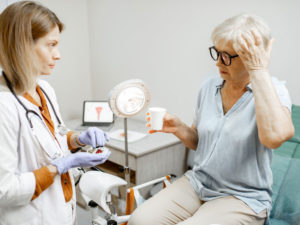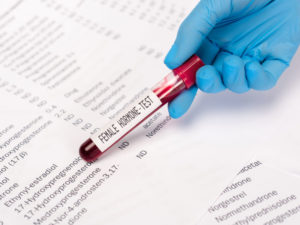
Hot flashes, night sweats, low libido, vaginal dryness, irritability to the point you don’t recognize yourself? These are just a few downsides of menopause, and although this transition is inevitable, the accompanying menopausal symptoms can be challenging. But you don’t have to live with them!
Fortunately, menopause treatment is available with bioidentical hormone replacement therapy (BHRT).
In this article, we’ll explore the connection between BHRT and menopausal symptoms, unveiling innovative health strategies to ease any challenges you face during this transition in your life.
Keep reading to uncover the different stages of menopause, the challenges you’ll face, and why BHRT hormone replacement therapy is the most effective treatment to fight menopause symptoms and avoid other health conditions caused by hormonal imbalance.
Table of Contents
Finding Relief From Menopausal Symptoms
Different Types of Hormone Replacement Therapy
Bioidentical Hormone Replacement Therapy (BHRT) or Systemic Hormone Therapy (HRT)?
Pros and Cons of Bioidentical Hormones
What is Menopause?
Menopause is a natural biological process in a woman’s life, signaling the end of her reproductive years. It typically occurs between the ages of 45 and 55, with an average age of 51.
But you may start experiencing the symptoms years before menopause due to the hormonal rollercoaster of estrogen and progesterone – the primary sexual hormones your ovaries produce.
Hormonal fluctuation is typical during each menstrual cycle. But as you age, your ovaries gradually decrease (and eventually interrupt) the production of these sex hormones. This has a significant impact on many of your body’s functions. More than we imagine. And this natural hormonal dip causes all those uncomfortable symptoms you may be experiencing.
Symptoms vary, but the most common ones include:
- Hot flashes
- Night sweats
- Sleep disturbances
- Mood swings
- Vaginal dryness or atrophy
- Weight gain
- Changes in metabolism
- Decreased bone density
- Increased risk of osteoporosis
- Higher risk of breast cancer or uterine cancer
- Breast tenderness
- Irritability
- Low sexual drive
These symptoms may be frustrating. And if you’ve undergone surgical menopause (total or radical hysterectomy that removes your ovaries), you’ll feel you have them sooner than you should.
But unlike many women believe, you don’t need to accept them after surgical menopause or as part of growing older. Menopause treatment in the form of hormone therapy can help to address the symptoms, and doing so improves many women’s health.
Different Stages of Menopause
Menopause itself lasts only one day! That’s the day marking one year since you had your last period. And if you think you’re nearly there, and a period arrives, that’s exasperating for you when you’ve waited, patiently enduring your symptoms. You have to start the count again!
When that one-year point finally arrives, it means you’re no longer fertile.
However, symptoms connected to your progress through menopause in general may last for years. That’s because it doesn’t happen overnight. It’s a process – which is why menopause and hormones are often thought of as the dreaded duo!
So – let’s look at the individual stages.
1 Perimenopause
Are you in your late 30s or early 40s and feeling low, with unpredictable periods, hot flashes, and mood swings? Chances are, you’re in perimenopause – the transitional phase leading up to menopause.
This first stage usually starts several years before menopause, when the body begins to undergo hormonal changes that cause
- irregular menstrual cycles,
- skipped periods, and
- heavier or lighter flow, which may contain blood clots.
Irregular periods may be the first sign of your perimenopause – but you may also experience some or all the uncomfortable symptoms we mentioned, like unwelcome hot flashes and vaginal dryness.
So, if you suspect you’re in perimenopause, don’t wait too long to talk to your healthcare provider about hormone therapy because menopause symptoms can significantly impact your quality of life for years.
Once perimenopause is confirmed, your doctor or a hormone replacement specialist can provide a personalized strategy to alleviate the symptoms of menopause and improve your wellbeing, including lifestyle changes and hormone replacement therapy (HRT).
2 Menopause
As we mentioned before, menopause is only a date to mark the 12 months since your last period. During the whole year before reaching that milestone, your ovaries gradually produce less estrogen and progesterone.
As a result, ovulation becomes less frequent, until it eventually stops. And when you don’t ovulate, your menstruation ceases, and you can no longer become naturally pregnant.
The good news is that those awful symptoms from perimenopause may gradually disappear. The bad news is the hormonal drop can cause other health concerns. That’s because estrogen and progesterone impact many other body functions, including bone and cardiovascular health. It’s important to prevent osteoporosis, for example, and cardiovascular disease.
So – the day of your menopause can sometimes feel like a seesaw from one set of problems to another! Let’s look at those years next.
3 Post-Menopause
This last stage is all the years following menopause when your body needs to adapt to the lack of certain hormones.
During post-menopause, you may finally find relief from menopausal symptoms. Still, you must take extra care of your overall health because the hormonal changes may lead to specific health conditions, which may include:
- Increased risk of osteoporosis and susceptibility to bone fractures
- Increased risk of heart disease and blood clots
- Weakened pelvic floor muscles and an increased risk of urinary incontinence and pelvic organ prolapse
- Vaginal dryness
- Changes in libido
- Increased risk of breast cancer and uterine cancer
But don’t assume you have to suffer during any of these menopausal stages.
You can easily start hormone replacement therapy, for example. This might be in the form of systemic hormone therapy (delivered by pill, injection, or patch) or local hormone therapy (e.g., a suppository to solve vaginal symptoms).
Consult your healthcare provider – they’re experts in helping you find a solution that works for you.
Finding Relief From Menopausal Symptoms
Regardless of what menopausal stage you’re currently living through, if you’re reading this article you know menopause can be both physically and emotionally challenging. But it doesn’t mean the end of the road. It’s only a marker.
As you’ve noticed with this brief introduction, the underlying causes of most menopause symptoms and potential health conditions from post-menopause are usually related to hormone imbalance and the lack of estrogen and progesterone. This can be addressed with hormonal replacement therapy.
And that’s why it’s crucial to understand your symptoms and explore available treatment options that are best for you.
Your healthcare provider will consider your medical history, any risks, and discuss with you the likely benefits, before you both decide on the right menopausal hormone therapy for you.
Fortunately, therapy for menopause has evolved. Your healthcare professional specializes in menopause management and hormone replacement therapy and can help you significantly improve your quality of life during this transitional phase.
BHRT and Menopausal Symptoms – Experience Relief
Your hormones are essential to your overall health and wellbeing. They’re chemical messengers that send signals to your body, ensuring everything works just fine.
But when one or more of your hormone levels are too low or too high, the others try to compensate for its absence or excess. This results in hormonal imbalance – with an immediate reaction in one or more of your body functions.
In the case of your sex hormones, for example, an imbalance in your progesterone or estrogen levels leads to those uncomfortable menopausal symptoms you suffer from. Or perhaps dysfunction in other body processes directly impacted by these hormones – like cardiovascular or bone health, for example.
However, to treat your symptoms with hormonal replacement therapy, we must
- understand which hormones and systems have been affected, and then
- replace the hormone or hormones to bring the level(s) back to normal.
Different types of menopausal hormone therapy are available with the same goal: to relieve your symptoms by restoring hormone levels to improve your quality of life.
At Nava Center, we specialize in BHRT as the best kind of hormone replacement therapy for menopause. But the actual hormones in the treatment may vary for a number of reasons. Let’s look at why.
Different Types of Hormone Replacement Therapy
Traditionally, hormone replacement therapy to address menopausal symptoms targets the hormones primarily produced in your ovaries – estrogen, progesterone, and testosterone.
After assessing your symptoms, your provider should determine whether you need
- estrogen-only therapy or
- a combination hormone therapy consisting of estrogen, progesterone, and testosterone.
This decision is based on your medical history and overall health to minimize risks and optimize benefits.
For example, suppose you have a family history of uterine or breast cancer. In that case, your doctor will probably recommend a combination of estrogen and progesterone. This is because estrogen alone may cause abnormal growth and increase the risk of cancer in your uterine lining. Adding progesterone protects the tissues of your breast, uterus, and brain.
You may also need to take testosterone as part of your hormone therapy to address low libido.
Bioidentical Hormone Replacement Therapy (BHRT) or Systemic Hormone Therapy (HRT)?
Unlike systemic hormone therapy (HT) – also known as hormone replacement therapy (HRT – which uses synthetic hormones created in a lab) – bioidentical hormone replacement therapy offers a personalized approach to hormone replacement, because it uses hormones that are molecularly identical to those your body produces.
That means they’re more likely to dock with your hormone receptors than synthetic ones, significantly decreasing your risks.
In addition, bioidentical hormones are sourced from plants such as yams and sweet potatoes and are formulated to mimic your natural hormones.
So, while synthetic hormones from traditional hormone replacement therapy are similar to those your body needs to replace, bioidentical ones are (obviously!) identical.
Another advantage of bioidentical hormone replacement therapy is that it’s tailored to your needs and can be adjusted to fit specific hormone requirements and dosages. In contrast, hormone therapy HRT offers standardized hormone products with predetermined dosages.
Pros and Cons of Bioidentical Hormones for Menopausal Symptoms
There’s no doubt hormone replacement therapy provides symptom relief and improves women’s health. However, as with any medical treatment, if you’re considering hormone therapy, you need to know the potential risks and benefits. This means consulting with a healthcare provider to determine the most suitable approach to navigate menopause with greater comfort and safety.
To help you, we’ll now highlight the main benefits and risks of bioidentical hormone replacement therapy, so you can evaluate with your doctor what’s the best treatment for you and make an informed choice.
Benefits of BHRT for Women
The main benefit of hormone therapy is restoring hormonal balance and improving your wellbeing. Menopause can be difficult, but you shouldn’t settle for enduring frustrating symptoms forever!
By restoring hormonal balance, bioidentical hormone therapy can effectively alleviate or eliminate the downsides of menopause, including the following symptoms:
- Hot flashes
- Vaginal dryness
- Mood swings
- Breast tenderness
- Anxiety and depression
- Low libido
Risks of BHRT
Hormone replacement therapy carries potential risks and side effects like any medical treatment. So they’re not really cons of hormone replacement, just risks to be aware of.
It’s essential you’re aware of these and discuss them with your healthcare professional before starting menopausal hormone therapy. So, make sure you ask your doctor about the following potential risks:
- Hormonal imbalance: Incorrectly prescribed BHRT hormone therapy can lead to hormonal imbalances, which may cause new or worsened symptoms. Regular monitoring and adjustments of your hormone therapy are crucial to ensure hormone levels remain within the optimal range.
- Breast tenderness and swelling: BHRT, particularly estrogen-only hormone therapy, may cause breast tenderness or swelling. Inform your healthcare provider if these symptoms persist or worsen.
- Bleeding and spotting: Estrogen and progesterone hormone therapy can cause irregular bleeding or spotting, especially during the early stages of your treatment.
- Increased risk of blood clots: Estrogen replacement therapy may slightly increase the risk of blood clots, including deep vein thrombosis (DVT) and pulmonary embolism (PE). The trouble is particularly significant if you have other risk factors for blood clots, such as a history of clotting disorders or smoking.
- The question of increased risk of certain cancers: You may have heard of studies suggesting a potential link between long-term estrogen hormone therapy and an increased risk of certain cancers, such as breast and ovarian cancer. However, this does NOT apply to BHRT, only to synthetic HRT, so please rest assured.
- Other side effects: Additional side effects of hormone therapy may include bloating, headaches, mood changes, nausea, weight changes, and skin reactions.
BHRT and Menopausal Symptoms – Find a Solution with Nava Health
As with any other life stage, menopause brings challenges and pleasures. Life doesn’t have to be less attractive just because you’re reaching that milestone.
With the right approach to hormone replacement therapy, it’s possible to restore confidence, self-esteem, and libido and reestablish your optimal health at any age.
If you’re ready to try menopause hormone therapy, like many other perimenopausal and postmenopausal women, Nava Health is your reference for BHRT. Our healthcare providers investigate the root causes of your discomfort to provide a tailor-made, individualized treatment to help you feel better than ever.
The relationship between BHRT and menopausal symptoms shows a revolutionary approach in alleviating the challenges faced during menopause. We’ll be with you during every step of your hormone replacement therapy journey, with regular monitoring and adjustments so that you can live a happy, vibrant, and sexy life during and after menopause.
Contact us today and discover how BHRT can help you uncover your best version!

A Medical Director, and one of the first physicians to join the Nava Health & Vitality Center, Dr. Douglas Lord has made significant contributions to our Center and its founding principles. Dr. Lord has helped develop and implement the Nava Method™—Nava’s proprietary approach to total body wellness. He has also been instrumental in liaising with other expert practitioners to successfully implement Nava’s range of therapies, treatments, and products.






